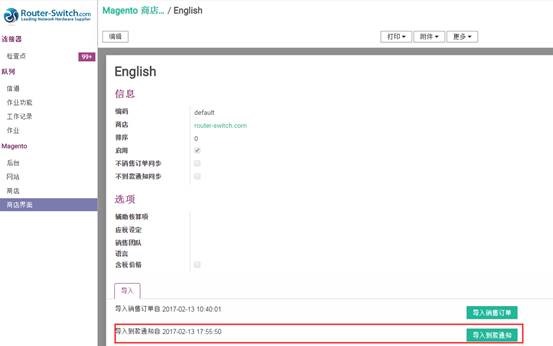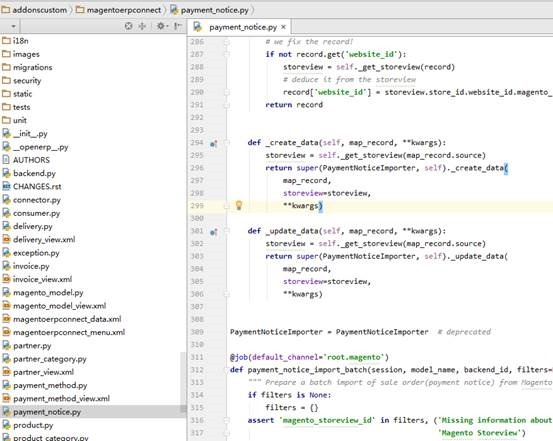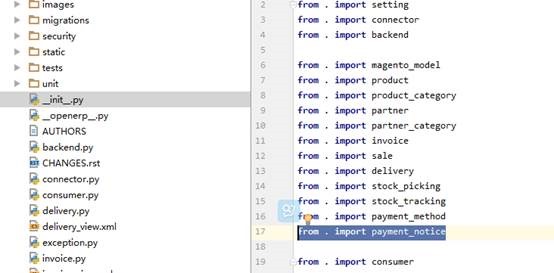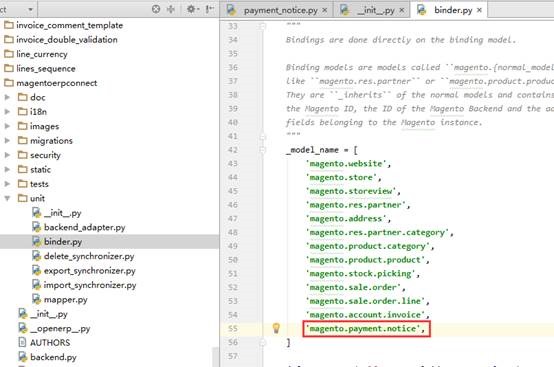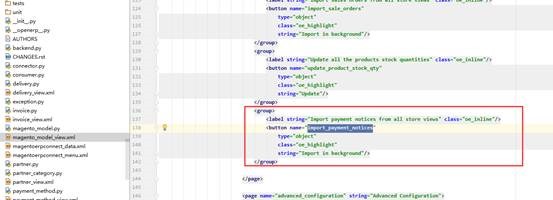这篇主要讲述如何二开增加自己的功能,我没有继承方式二开,习惯是不好的,直接改了原来的模块。
达到效果就这样,当在网站支付成功,会同步到ERP系统中。下面来讲述实现过程
建立文件 payment_notice.py
# -*- coding: utf-8 -*-
import logging
import xmlrpclib
from datetime import datetime, timedelta
import openerp.addons.decimal_precision as dp
from openerp import models, fields, api, _
from openerp.addons.connector.connector import ConnectorUnit
from openerp.addons.connector.exception import (NothingToDoJob,
FailedJobError,
IDMissingInBackend)
from openerp.addons.connector.queue.job import job
from openerp.addons.connector.unit.mapper import (mapping,
ImportMapper
)
from .unit.backend_adapter import (GenericAdapter,
MAGENTO_DATETIME_FORMAT,
)
from .unit.import_synchronizer import (DelayedBatchImporter,
MagentoImporter,
)
from .unit.mapper import normalize_datetime
from .backend import magento
from .connector import get_environment
from openerp.tools.float_utils import float_round
_logger = logging.getLogger(__name__)
class MagentoPaymentNotice(models.Model):
_name = 'magento.payment.notice'
_inherit = 'magento.binding'
_description = 'Magento Payment Notice'
_inherits = {'payment.notice': 'openerp_id'}
openerp_id = fields.Many2one(comodel_name='payment.notice',
string='Payment Notice',
required=True,
ondelete='cascade')
total_amount = fields.Float(
string='Total amount',
digits_compute=dp.get_precision('Account')
)
total_amount_tax = fields.Float(
string='Total amount w. tax',
digits_compute=dp.get_precision('Account')
)
magento_order_id = fields.Integer(string='Magento Order ID',
help="'order_id' field in Magento")
# when a sale order is modified, Magento creates a new one, cancels
# the parent order and link the new one to the canceled parent
magento_parent_id = fields.Many2one(comodel_name='magento.sale.order',
string='Parent Magento Order')
storeview_id = fields.Many2one(comodel_name='magento.storeview',
string='Magento Storeview')
store_id = fields.Many2one(related='storeview_id.store_id',
string='Storeview',
readonly=True)
class PaymentNotice(models.Model):
_inherit = 'payment.notice'
magento_bind_ids = fields.One2many(
comodel_name='magento.payment.notice',
inverse_name='openerp_id',
string="Magento Bindings",
)
@magento
class PaymentNoticeAdapter(GenericAdapter):
_model_name = 'magento.payment.notice'
_magento_model = 'sales_order'
_admin_path = '{model}/view/order_id/{id}'
def _call(self, method, arguments):
try:
return super(PaymentNoticeAdapter, self)._call(method, arguments)
except xmlrpclib.Fault as err:
# this is the error in the Magento API
# when the sales order does not exist
if err.faultCode == 100:
raise IDMissingInBackend
else:
raise
def search(self, filters=None, from_date=None, to_date=None,
magento_storeview_ids=None):
""" Search records according to some criteria
and returns a list of ids
:rtype: list
"""
if filters is None:
filters = {}
dt_fmt = MAGENTO_DATETIME_FORMAT
if from_date is not None:
filters.setdefault('created_at', {})
filters['created_at']['from'] = from_date.strftime(dt_fmt)
if to_date is not None:
filters.setdefault('created_at', {})
filters['created_at']['to'] = to_date.strftime(dt_fmt)
if magento_storeview_ids is not None:
filters['store_id'] = {'in': magento_storeview_ids}
arguments = {'imported': False,
# 'limit': 200,
'filters': filters,
}
return super(PaymentNoticeAdapter, self).search(arguments)
def read(self, id, attributes=None):
""" Returns the information of a record
:rtype: dict
"""
record = self._call('%s.info' % self._magento_model,
[id, attributes])
return record
@magento
class PaymentNoticeBatchImport(DelayedBatchImporter):
_model_name = ['magento.payment.notice']
def _import_record(self, record_id, description=None,**kwargs):
""" Import the record directly """
return super(PaymentNoticeBatchImport, self)._import_record(
record_id,description=description, max_retries=0, priority=5)
def run(self, filters=None):
""" Run the synchronization """
if filters is None:
filters = {}
filters['status'] = {'in': ['complete', 'processing', 'challenged']}
from_date = filters.pop('from_date', None)
to_date = filters.pop('to_date', None)
magento_storeview_ids = [filters.pop('magento_storeview_id')]
record_ids = self.backend_adapter.search(
filters,
from_date=from_date,
to_date=to_date,
magento_storeview_ids=magento_storeview_ids)
_logger.info('search for magento saleorders %s returned %s',
filters, record_ids)
for record_id in record_ids:
self._import_record(
record_id,
description='Import payment notice, Order# of website: %s' % self.backend_adapter.read(record_id).get('increment_id')
)
@magento
class PaymentNoticeImportRule(ConnectorUnit):
_model_name = ['magento.payment.notice']
def check(self, record):
""" Check whether the current sale order should be imported
or not. It will actually use the payment method configuration
and see if the choosed rule is fullfilled.
:returns: True if the sale order should be imported
:rtype: boolean
"""
payment_method = record['payment']['method']
method = self.env['payment.method'].search(
[('magento_payment_code', '=', payment_method)],
limit=1,
)
if not method:
raise FailedJobError(
"The configuration is missing for the Payment Method '%s'.
"
"Resolution:
"
"- Go to "
"'Sales > Configuration > Sales > Customer Payment Method
"
"- Create a new Payment Method with name '%s'
"
"-Eventually link the Payment Method to an existing Workflow "
"Process or create a new one." % (payment_method,
payment_method))
@magento
class PaymentNoticeImportMapper(ImportMapper):
_model_name = 'magento.payment.notice'
direct = [('increment_id', 'magento_id'),
('order_id', 'magento_order_id'),
('grand_total', 'total_amount'),
('tax_amount', 'total_amount_tax'),
('store_id', 'storeview_id'),
]
@mapping
def sale_order_site(self, record):
sale_order_site = record['increment_id']
return {'sale_order_site': sale_order_site}
@mapping
def amount(self, record):
amount = record['grand_total']
return {'amount': amount}
@mapping
def currency(self, record):
record_currency = record['order_currency_code']
currency = self.env['res.currency'].search(
[['name', '=', record_currency]],
limit=1,
)
assert currency, ("currency %s should exist because the import fails "
"in PaymentNoticeImporter._before_import when it is "
" missing" % record['order_currency_code'])
return {'currency_id': currency.id}
@mapping
def payment(self, record):
record_method = record['payment']['method']
method = self.env['payment.method'].search(
[['magento_payment_code', '=', record_method]],
limit=1,
)
assert method, ("method %s should exist because the import fails "
"in PaymentNoticeImporter._before_import when it is "
" missing" % record['payment']['method'])
return {'payment_method_id': method.id}
@mapping
def description(self, record):
order_date = normalize_datetime('created_at')(self, record, '')
dd=datetime.strptime(order_date, '%Y-%m-%d %H:%M:%S')
order_date_f=dd.strftime('%m/%d/%Y')
record_currency = record['order_currency_code']
billing_address = record['billing_address']
billing_name = billing_address['firstname']+' ' + billing_address['lastname']
paypal_id = record['payment']['last_trans_id'] and record['payment']['last_trans_id'] or ''
prec = self.env['decimal.precision'].precision_get('Account')
amount = str(float_round(float(record['grand_total']), prec))
payment_method = record['payment']['method']
if payment_method == 'paypal_standard' or payment_method =='paypal_express' :
description = order_date_f+' '+billing_name +' '+ record_currency+' '+amount+ ' ID: '+ paypal_id
else:
description = order_date_f + ' ' + billing_name + ' ' + record_currency + ' ' + amount
return {'description': description}
@mapping
def backend_id(self, record):
return {'backend_id': self.backend_record.id}
@magento
class PaymentNoticeImporter(MagentoImporter):
_model_name = ['magento.payment.notice']
_base_mapper = PaymentNoticeImportMapper
def _must_skip(self):
if self.binder.to_openerp(self.magento_id):
return _('Already imported')
def _before_import(self):
rules = self.unit_for(PaymentNoticeImportRule)
rules.check(self.magento_record)
def _get_storeview(self, record):
""" Return the tax inclusion setting for the appropriate storeview """
storeview_binder = self.binder_for('magento.storeview')
# we find storeview_id in store_id!
# (http://www.magentocommerce.com/bug-tracking/issue?issue=15886)
return storeview_binder.to_openerp(record['store_id'], browse=True)
def _get_magento_data(self):
""" Return the raw Magento data for ``self.magento_id`` """
record = super(PaymentNoticeImporter, self)._get_magento_data()
# sometimes we don't have website_id...
# we fix the record!
if not record.get('website_id'):
storeview = self._get_storeview(record)
# deduce it from the storeview
record['website_id'] = storeview.store_id.website_id.magento_id
return record
def _create_data(self, map_record, **kwargs):
storeview = self._get_storeview(map_record.source)
return super(PaymentNoticeImporter, self)._create_data(
map_record,
storeview=storeview,
**kwargs)
def _update_data(self, map_record, **kwargs):
storeview = self._get_storeview(map_record.source)
return super(PaymentNoticeImporter, self)._update_data(
map_record,
storeview=storeview,
**kwargs)
PaymentNoticeImporter = PaymentNoticeImporter # deprecated
@job(default_channel='root.magento')
def payment_notice_import_batch(session, model_name, backend_id, filters=None):
""" Prepare a batch import of sale order(payment notice) from Magento """
if filters is None:
filters = {}
assert 'magento_storeview_id' in filters, ('Missing information about '
'Magento Storeview')
env = get_environment(session, model_name, backend_id)
importer = env.get_connector_unit(PaymentNoticeBatchImport)
importer.run(filters)
在 __init__.py
在 unit/binder 下加入
在magento_model.py 加入
在_name = 'magento.storeview' 类中
@api.multi
def import_payment_notices(self):
session = ConnectorSession(self.env.cr, self.env.uid,
context=self.env.context)
import_start_time = datetime.now()
for storeview in self:
if storeview.no_payment_notice_sync:
_logger.debug("The storeview '%s' is active in Magento "
"but is configured not to import the "
"payment notices", storeview.name)
continue
backend_id = storeview.backend_id.id
if storeview.import_payment_notices_from_date:
from_string = fields.Datetime.from_string
from_date = from_string(storeview.import_payment_notices_from_date)
else:
from_date = None
payment_notice_import_batch.delay(
session,
'magento.payment.notice',
backend_id,
{'magento_storeview_id': storeview.magento_id,
'from_date': from_date,
'to_date': import_start_time},
priority=1,
) # executed as soon as possible
next_time = import_start_time - timedelta(seconds=IMPORT_DELTA_BUFFER)
next_time = fields.Datetime.to_string(next_time)
self.write({'import_payment_notices_from_date': next_time})
return True
在_name = 'magento.backend'
中
import_payment_notices_from_date = fields.Datetime(
string='Import payment notices from date',
help='do not consider non-imported payment notice before this date. '
'Leave empty to import all payment notice of sale orders',
)
@api.multi
def import_payment_notices(self):
""" Import sale orders from all store views """
storeview_obj = self.env['magento.storeview']
storeviews = storeview_obj.search([('backend_id', 'in', self.ids)])
storeviews.import_payment_notices()
return True
@api.model
def _scheduler_import_payment_notices(self, domain=None):
self._magento_backend('import_payment_notices', domain=domain)
在magentoerpconnect_data.xml 中加入
<record forcecreate="True" id="ir_cron_import_payment_notices" model="ir.cron">
<field name="name">Magento - Import Payment Notices</field>
<field eval="False" name="active"/>
<field name="user_id" ref="base.user_root"/>
<field name="interval_number">1</field>
<field name="interval_type">days</field>
<field name="numbercall">-1</field>
<field eval="False" name="doall"/>
<field eval="'magento.backend'" name="model"/>
<field eval="'_scheduler_import_payment_notices'" name="function"/>
<field eval="'()'" name="args"/>
</record>
剩下来,就是界面的设定
这样就完成了。
